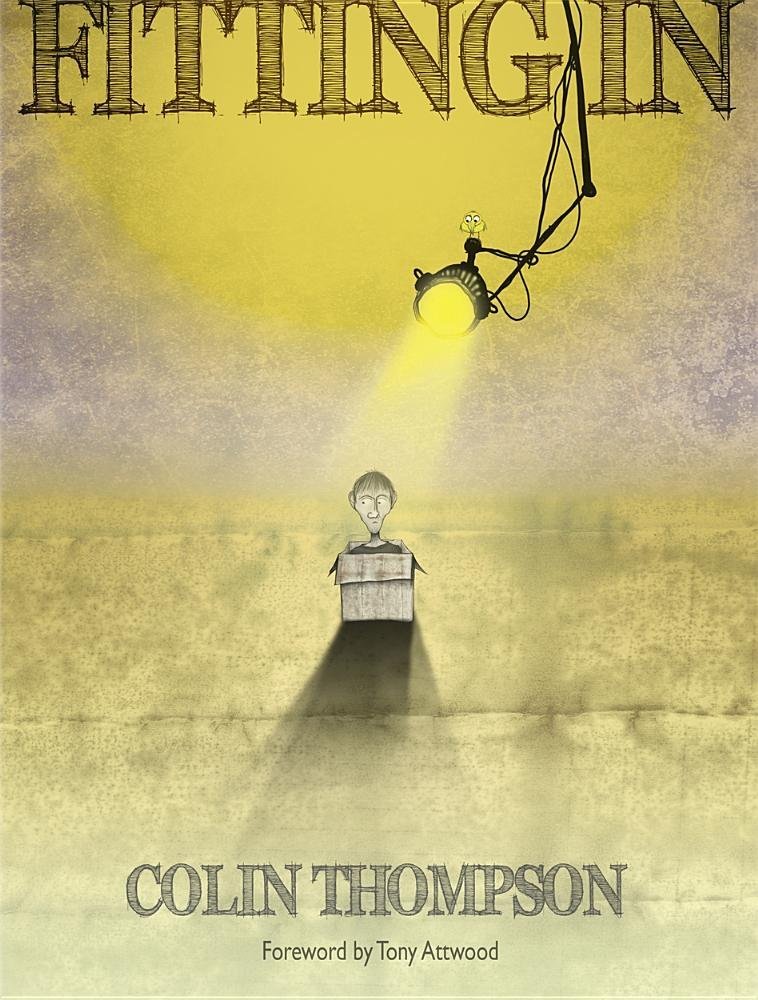 Reviewed by Jeanne Palmateer
Reviewed by Jeanne Palmateer
Fitting In
by Colin Thompson
Jessica Kingsley Publishers
June 21, 2016, Hardcover: 232 pages, ISBN-13: 978-1785920462
When I first cracked open Colin Thompson’s book Fitting In, I was overcome with a delight only found in a truly atheistically pleasing book. The inside cover is graced with a drawing of a bookshelf that is full of cleverly titled books and delightful scenes that connect to the titles of the books. My imagination was sparked by the colors and creativity of the first few pages. The artistic drawings and photographs continued to hold my attention throughout the book. Each page brings new insights from stories told in creative, serious, and sarcastic tones. There were many times that I would laugh and wince while reading the same page.
Thompson’s writing is vivid and authentic. Some of these vivid moments made my stomach curdle with disgust at the terrible things that were happening in a young boy’s life. In other moments, my heart sunk as I read about his heartbreak and searching for peace, all while in the grips of life-altering depression. However, I also found myself laughing at some comical parts or completely clever lines. One line, about the boarding school he attended while a child, particularly drew me into the his story with a deep interest:
It looked like a childhood dream, long days of Latin and cricket, of playing in the trees, cross-country running and training to become a leader of men, uniforms and views of the world from Harrods, privilege for the privileged in yet another isolated cocoon. But there was a darkness about the place like an invisible cloak, a darkness that could stifle innocence, a darkness like a memory of Charles Dickens. (Thompson 43).
And it is over the next few pages that Thompson explains the reason for the darkness over the place – but I’ll let you read the book to find that out for yourself. In addition to the intriguing metaphors, Thompson gives the reader a glimpse into his battle with depression and his search to fit in even though his Asperger’s made it difficult to do so.
Fitting In gives deep psychological and artistic insights to Thompson’s transition from childhood into adulthood, and what it is like to battle with depression. Manic depression is made real and given a voice in the accounts of his young adult years. Thompson’s writing gives the reader a meaningful picture of what his experience with depression was like. Such as when he writes,
I fell slowly and relentlessly into a deep dark hole of unrelieved depression. And then I spent three years sitting in the hole looking up at the sky until I had a crick in my neck and not once did the blue bird fly over, though a bit of me never stopped believing it would.
In those days, which were 1962, the only known cure for depression was Snap Out of It. It still is, though slightly less, a popular treatment.
Which is amazing, considering the millions of people who have discovered it doesn’t work. (Thompson, 81).
The depression is a level of the book that aligns with his trying to fit in while living with Asperger’s. Some of the most colorful and creative pages of the book follow the line: “When I was a child, I fitted in perfectly. Then I got bigger, but the box stayed the same size.” (Thompson 89). The next twelve pages go on to give descriptions and explanations of what Asperger’s is and how those with it interact with the world. During these pages, he writes to the reader while giving rules and understanding to the “they” who don’t have Asperger’s; “Rule #1 We are not broken or better or worse.” (Thompson 92). These were lessons I took to heart.
The clever storytelling of Colin Thompson in Fitting In somehow binds itself to you and makes you fully engaged with the pages in front of you. It invites you to sit and read a page or two and then ponder what you just read. My eyes were opened to a life completely different from my own. This is the beauty of memoirs. They pull you out of the self-centered life you may be living and make you engage with someone else’s life story. As I read, I saw the raw and coarse pain of depression and the desire to fit in. Thompson’s honesty made me develop compassion for something I myself have never known. It forced me to look at a part of the world that I do not often see. I will definitely be re-reading Thompson’s memoir some time soon.
About the reviewer: Jeanne Palmateer is a senior at Bethel College, Indiana. She is pursuing a major in English and Writing. After graduating, she plans to continue writing and working within the literary community.